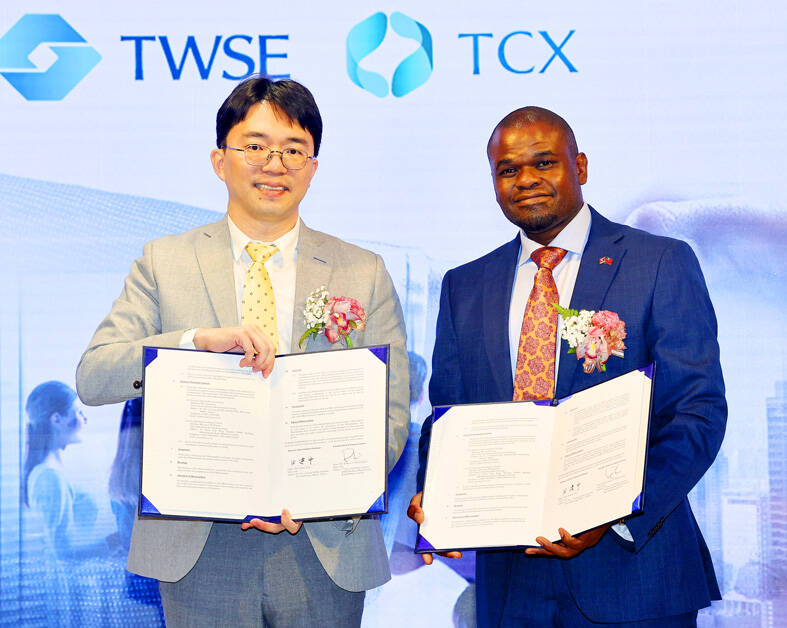The Taiwan Stock Exchange (TWSE) and the Taiwan Carbon Solution Exchange (TCX) on Monday each signed memorandums of understanding (MOU) with the Eswatini Stock Exchange in Taipei.
The signings with Eswatini, Taiwan’s only remaining UN-recognized diplomatic ally in Africa, came in response to Taipei’s foreign policy efforts, and are a significant milestone for cooperation between the two sides’ capital markets, the TWSE said in a statement.
TCX CEO Joshua Tien (田建中) said its MOU would link the two carbon credit markets, with credits based on Eswatini’s abundant natural resources likely to be traded on the TCX.

Photo: CNA
As for the stock exchange MOU, TWSE president Chien Lih-chung (簡立忠) said it was the first partnership between Taiwan and Eswatini related to capital markets and had symbolic significance.
“The collaboration will enable Taiwan to share its experience with the world and bolster Taiwan’s international influence,” Chien said.
Ray Lin (林瑞岳) — chairman of Taiwanese textile group Tex-Ray Industrial Co, which has invested in Eswatini for more than 20 years, and a former honorary consul-general of Eswatini in Taiwan — was a key advocate for the MOU signings.
He said he has high expectations for bilateral cooperation on carbon credits because of Eswatini’s natural resources and the carbon sinks they represent.
The partnership between the countries would start with exchanging carbon credit-related information and sharing carbon credit techniques and know-how, before expanding to talent training and other substantive exchanges, Tien said.
Eswatini’s carbon credits, which would most likely be “green and yellow carbon” credits, could be traded on the TCX after being certified by international institutions and reviewed by the Ministry of Environment, he said.
Green credits are from natural carbon sinks found on land, mainly forests, while yellow credits are soil, and can be created by changing to organic farming practices, he said.
Central Bank of Eswatini Governor Phil Mnisi, who witnessed the signings, said that Eswatini’s climate issues, including floods, droughts and heat waves, have worsened in the past few years, indicating that climate change must be addressed immediately.
Carbon credits are one way to do so, he said, adding that Article 6 of the Paris Agreement allows countries to transfer carbon credits earned from the reduction of greenhouse gas emissions to another country to meet the climate targets.
Liou Je-liang (劉哲良), TCX board member and a research fellow at the Center for Green Energy of the Chung-Hua Institution for Economic Research in Taipei, said that Article 6 provides a way for Taiwan and Eswatini to work together on carbon credits.
Taiwan is not a signatory to the Paris Agreement, adopted by UN members in 2015, but it has kept tabs on the agreement’s requirements and aligned its policies accordingly.
Compared with Taiwan’s foreign aid to its allies, which mainly involves one-way financial assistance, the MOU on carbon promises mutual benefits, with Taiwan helping with carbon credit techniques and certification, while Eswatini lists carbon credits on the TCX, Liou said.

Chinese spouse and influencer Guan Guan’s (關關) residency permit has been revoked for repeatedly posting pro-China videos that threaten national security, the National Immigration Agency confirmed today. Guan Guan has said many controversial statements in her videos posted to Douyin (抖音), including “the red flag will soon be painted all over Taiwan” and “Taiwan is an inseparable part of China,” and expressing hope for expedited reunification. The agency last year received multiple reports alleging that Guan Guan had advocated for armed reunification. After verifying the reports, the agency last month issued a notice requiring her to appear and explain her actions. Guan

GIVE AND TAKE: Blood demand continues to rise each year, while fewer young donors are available due to the nation’s falling birthrate, a doctor said Blood donors can redeem points earned from donations to obtain limited edition Formosan black bear travel mugs, the Kaohsiung Blood Center said yesterday, as it announced a goal of stocking 20,000 units of blood prior to the Lunar New Year. The last month of the lunar year is National Blood Donation Month, when local centers seek to stockpile blood for use during the Lunar New Year holiday. The blood demand in southern Taiwan — including Tainan and Kaohsiung, as well as Chiayi, Pingtung, Penghu and Taitung counties — is about 2,000 units per day, the center said. The donation campaign aims to boost

The Kaohsiung Tourism Bureau audited six hotels in an effort to prevent price gouging ahead of Korean band BTS’ concert tour in the city scheduled for Nov. 19, 21 and 22 this year. The bureau on Friday said that the audits — conducted in response to allegations of unfair pricing posted on social media — found no wrongdoing. These establishments included the local branches of Chateau de Chine, Hotel Nikko, My Humble House, and Grand Hai Lai, it said, adding that the Consumer Protection Commission would have penalized price gougers had the accusations been substantiated. The bureau said the Tourism Development Act

BACK TO WINTER: A strong continental cold air mass would move south on Tuesday next week, bringing colder temperatures to northern and central Taiwan A tropical depression east of the Philippines could soon be upgraded to be the first tropical storm of this year, the Central Weather Administration (CWA) said yesterday, adding that the next cold air mass is forecast to arrive on Monday next week. CWA forecaster Cheng Jie-ren (鄭傑仁) said the first tropical depression of this year is over waters east of the Philippines, about 1,867km southeast of Oluanpi (鵝鑾鼻), and could strengthen into Tropical Storm Nokaen by early today. The system is moving slowly from northwest to north, and is expected to remain east of the Philippines with little chance of affecting Taiwan,